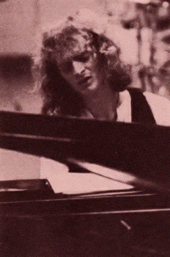Of the many now-legendary artists to emerge from the Krautrock movement, few anticipated the rise of modern electronic music with the same prescience as Popol Vuh the first German band to employ a Moog synthesizer, their work not only anticipated the emergence of ambient, but also proved pioneering in its absorption of worldbeat textures. At much the same time Popol Vuh was formed in Munich in 1969, another group, of Norwegian descent, adopted the same name, an endless source of confusion in the years to follow; both were inspired by the holy book of Guatemala's Quiche Indians, and according to Mayan researchers the title roughly translates as "meeting place." Keyboardist Florian Fricke was deeply immersed in Mayan myth at the time he formed the group with synth player Frank Fiedler and percussionist Holger Trulzsch, and his interests were reflected in the spiritual themes of their 1970 debut, Affenstunde.
The follow-up two years later, In den Garten Pharaos, was Popol Vuh's creative breakthrough, an intensely meditative work fusing ambient textures with organic percussion. In its wake, however, Fricke converted to Christianity, a move which sparked a rejection of electronics in favor of traditional ethnic instrumentation including guitars, oboe and tamboura; he then tapped korean soprano Djong Yun to lend vocals to 1972's lovely Hosianna Mantra. Fricke next teamed with onetime Amon Duul II drummer Daniel Fichelscher for the next Popol Vuh LP, Seligpreisung; its follow-up, 1975's Einjager und Siebenjager, remains widely considered among the group's most stunning efforts. That same year, they began a lengthy creative partnership with the celebrated filmmaker Werner Herzog which yielded soundtracks for features including Aguirre, Wrath of God, Fitzcarraldo and Nosferatu.
Throughout the latter half of the 1970s, Popol Vuh's fascination with global sounds and instruments continued, with the prominence of sitars, tablas and tamboura percussion on LPs like 1977's Herz aus Glas and 1979's Die Nacht der Seele: Tantric Songs earning their latter-day sound descriptions like "raga rock." In 1978, Fricke founded the Working Group for Creative Singing and also became a member of the Breathing Therapy Society, travelling the world to lecture on both subjects; ultimately, his outside passions began to overshadow his work in Popol Vuh, and as the 1980s dawned the group began losing steam, calling it quits after 1983's excellent Agape Agape. After reuniting two years later for Spirit of Peace, Fricke again reassembled Popol Vuh for the 1997 LP Shepherd's Symphony.
© All Music Guide
[Discography]
[Buy Popol Vuh Music]
[Popol Vuh @ Prog Archives]
